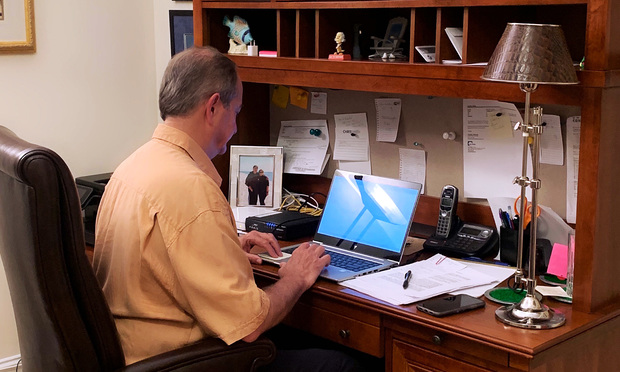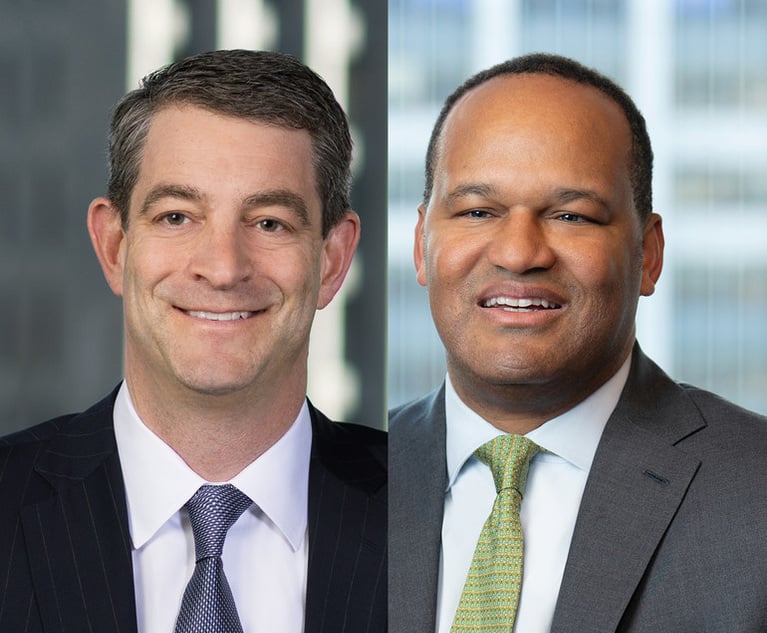An Overnight Shift: How the Pandemic Has Radically Changed the Role of Practice Leader
After-hours calls, movie nights with family and an uncertain future: DLA Piper New York real estate co-chair Chris Smith dishes on how the current crisis has affected his job.
June 29, 2020 at 05:00 AM
6 minute read
 Chris Smith, with DLA Piper, working from home during the Coronavirus pandemic. June 7, 2020.
Chris Smith, with DLA Piper, working from home during the Coronavirus pandemic. June 7, 2020.
Editor's note: This article is part of The New View, a special report from The American Lawyer on how the coronavirus crisis is changing the way work gets done across the legal industry—now and in the future.
The novel coronavirus upended DLA Piper partner Chris Smith's practice almost immediately.
He remembers the murmurs in the office—"What's going to happen?"—when the coronavirus had yet to become a domestic threat. Then people began to social distance. And then, in mid-March, DLA leadership made the decision to move the workforce remote.
"I was pushed to make sure that we were ready to go, that I and my team knew what was expected," says Smith, who co-leads DLA's New York real estate practice. "I felt like it happened overnight."
The pandemic has upturned the entire legal industry and the world at large at a breakneck speed. Business closures and economic free-fall have transformed practices in all firms, Smith's included. And not only have the matters changed, but the way legal services are delivered has been altered entirely.
 Credit: Roberto Jiménez/Shutterstock.com
Credit: Roberto Jiménez/Shutterstock.comSmith's practice, the way he works and how he views the future of the law have been refashioned by the pandemic. He went from putting together deals and finding financing for clients to advising his clients at all hours on nonpaying tenants, plummeting valuations and lenders. He is not alone.
But many are optimistic that the economy isn't as fundamentally damaged as it was in 2008, and they see a small bounce-back in the real estate market as capital waits in the wings.
Big Questions, Few Answers
The adjustment to remote work did not come naturally to Smith, who made the first lateral move of his career in 2018, when he left Shearman & Sterling at age 67.
"Some of us, including myself, are a little slower at that than we probably should have been because we've been dependent on administrative assistants and associates to do some of these things," Smith says.
But he has been impressed with the ease of shifting his practice remotely. Since Smith left the office in March, he has been working from his home in upstate New York with his wife and two adult children. He has loved having his children around—the family recently watched "Top Gun" for movie night.
Before the coronavirus made its way to U.S. shores, Smith primarily worked on typical real estate matters: financing, ground leasing and acquisitions. Now, his practice has been divided into two buckets.
He first wrapped up the big deals that were in the pipeline and were carried through to the end. Nearly everything else has been advising: What rights do landlords have if tenants refuse to pay? How should clients handle evaluations, which changed significantly as the economy tanked? How should clients deal with lenders?
"Big questions and not a lot of easy answers," Smith says. "All this advisory stuff became, very quickly, front and center. It clearly grew at an exponential rate until people got a sense of what's going to happen and how it's happening."
In this advisory role, his job has become a nearly 24/7 endeavor. Clients call late into the night now, as late as 11:30 p.m. Remote work has eroded norms, as the hours and days blend into one another.
Volume has not dropped, Smith says. Between pipeline projects and advisory work, he and his team have stayed just as busy as they were before the pandemic. But not everybody has been as fortunate. An ALM survey of nearly 300 attorneys found that more than half of the respondents had experienced fewer clients calls and matters as a result of the pandemic. This turmoil has led firms big and small to institute austerity measures, with some cutting pay as much as 25% for associates and staff.
Holland & Knight real estate practice group leader Joe Guay has seen a turn in his practice similar to Smith: He's handling more advisory work for landlords and hoteliers on legal questions and federal assistance, while wrapping up big deals that were already in the pipeline. He says the pandemic-induced recession has not battered the market in the same fashion as the Great Recession, which was catalyzed by the collapse of Lehman Brothers and the implosion of financial markets.
"The day before Lehman Brothers announced bankruptcy there were 15 deals on my desk, and after there was one," Guay says. "This time around, private equity and the banks are in pretty good condition."
And as states slowly begin to reopen from months of business closures, Guay and Smith are seeing signs of life. Guay's team has begun to field calls from lenders who are picking deals back up. Lenders are doling out construction loans. The firm's land use attorneys, often the first in line in many deals, are seeing business return.
"Right now, people are seeing that pricing is attractive," Guay says. "Maybe not in the third quarter, but in the fourth quarter you're going to start seeing great deal flow."
Smith, on the other hand, is a bit more pessimistic. Capital is looking for ways to enter the market, he says, but there is so much uncertainty. Investors are looking at the hospitality industry, in particular, which has seen some of the worst effects of the pandemic, with occupancy hovering between 8% and 20% at hotels and valuations taking a nosedive.
As in previous recessions, this opens the door to investors looking to scoop up distressed assets. But because of the inability to predict what this economic recovery might look like, lenders have been skittish regarding hotels. Many have chosen to wait to see how valuations shake out.
"A lot of capital that would normally borrow money is ready to go but doesn't have a lender ready," Smith says. "How will that market sort out over time? It is clear there's a lot of capital being formed."
Smith also anticipates changes to the business of law writ large. Remote working is here to stay, he says. Firms will be more flexible in work arrangements and, if not, attorneys will vote with their feet. And business development norms will have to be reconfigured as well.
"How do we play good offense in the context where everyone is remote? Is that going to put a whole new spectrum into play that we don't have now?" Smith wonders.
Like the rest of the legal industry, he'll have to wait for an answer.
Email: [email protected]
This content has been archived. It is available through our partners, LexisNexis® and Bloomberg Law.
To view this content, please continue to their sites.
Not a Lexis Subscriber?
Subscribe Now
Not a Bloomberg Law Subscriber?
Subscribe Now
NOT FOR REPRINT
© 2025 ALM Global, LLC, All Rights Reserved. Request academic re-use from www.copyright.com. All other uses, submit a request to [email protected]. For more information visit Asset & Logo Licensing.
You Might Like
View All
'None of Us Like It': How Expedited Summer Associate Recruiting Affects Law Students and the Firms Hiring Them

Latham's Lateral Hiring Picks Up Steam, With Firm Adding Simpson Practice Head, Private Equity GC
3 minute read

Leaning Into ‘Core’ Strengths, Jenner’s Revenue Climbs 17%, Profits Soar 23%
4 minute readLaw Firms Mentioned
Trending Stories
- 1Mastering Litigation in New York’s Commercial Division Part V, Leave It to the Experts: Expert Discovery in the New York Commercial Division
- 2GOP-Led SEC Tightens Control Over Enforcement Investigations, Lawyers Say
- 3Transgender Care Fight Targets More Adults as Georgia, Other States Weigh Laws
- 4Roundup Special Master's Report Recommends Lead Counsel Get $0 in Common Benefit Fees
- 5Georgia Justices Urged to Revive Malpractice Suit Against Retired Barnes & Thornburg Atty
Who Got The Work
J. Brugh Lower of Gibbons has entered an appearance for industrial equipment supplier Devco Corporation in a pending trademark infringement lawsuit. The suit, accusing the defendant of selling knock-off Graco products, was filed Dec. 18 in New Jersey District Court by Rivkin Radler on behalf of Graco Inc. and Graco Minnesota. The case, assigned to U.S. District Judge Zahid N. Quraishi, is 3:24-cv-11294, Graco Inc. et al v. Devco Corporation.
Who Got The Work
Rebecca Maller-Stein and Kent A. Yalowitz of Arnold & Porter Kaye Scholer have entered their appearances for Hanaco Venture Capital and its executives, Lior Prosor and David Frankel, in a pending securities lawsuit. The action, filed on Dec. 24 in New York Southern District Court by Zell, Aron & Co. on behalf of Goldeneye Advisors, accuses the defendants of negligently and fraudulently managing the plaintiff's $1 million investment. The case, assigned to U.S. District Judge Vernon S. Broderick, is 1:24-cv-09918, Goldeneye Advisors, LLC v. Hanaco Venture Capital, Ltd. et al.
Who Got The Work
Attorneys from A&O Shearman has stepped in as defense counsel for Toronto-Dominion Bank and other defendants in a pending securities class action. The suit, filed Dec. 11 in New York Southern District Court by Bleichmar Fonti & Auld, accuses the defendants of concealing the bank's 'pervasive' deficiencies in regards to its compliance with the Bank Secrecy Act and the quality of its anti-money laundering controls. The case, assigned to U.S. District Judge Arun Subramanian, is 1:24-cv-09445, Gonzalez v. The Toronto-Dominion Bank et al.
Who Got The Work
Crown Castle International, a Pennsylvania company providing shared communications infrastructure, has turned to Luke D. Wolf of Gordon Rees Scully Mansukhani to fend off a pending breach-of-contract lawsuit. The court action, filed Nov. 25 in Michigan Eastern District Court by Hooper Hathaway PC on behalf of The Town Residences LLC, accuses Crown Castle of failing to transfer approximately $30,000 in utility payments from T-Mobile in breach of a roof-top lease and assignment agreement. The case, assigned to U.S. District Judge Susan K. Declercq, is 2:24-cv-13131, The Town Residences LLC v. T-Mobile US, Inc. et al.
Who Got The Work
Wilfred P. Coronato and Daniel M. Schwartz of McCarter & English have stepped in as defense counsel to Electrolux Home Products Inc. in a pending product liability lawsuit. The court action, filed Nov. 26 in New York Eastern District Court by Poulos Lopiccolo PC and Nagel Rice LLP on behalf of David Stern, alleges that the defendant's refrigerators’ drawers and shelving repeatedly break and fall apart within months after purchase. The case, assigned to U.S. District Judge Joan M. Azrack, is 2:24-cv-08204, Stern v. Electrolux Home Products, Inc.
Featured Firms
Law Offices of Gary Martin Hays & Associates, P.C.
(470) 294-1674
Law Offices of Mark E. Salomone
(857) 444-6468
Smith & Hassler
(713) 739-1250










